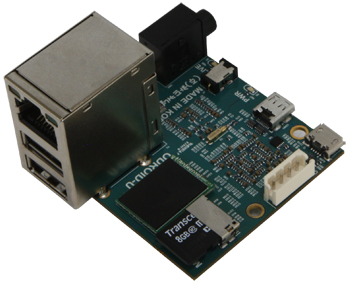From APOD, of course (full resolution):
Saturday, December 29, 2012
Computers Are Almost Free...
The inexorable hardware march toward smaller size, lower cost, higher performance continues apace. The board pictured at right is an ODROID-U2, half the size of a credit card. It's powered by an Exynos 4412 1.7 GHz quad-core ARM processor, sports 2 GB of RAM, and includes 10/100 mbps Ethernet, an HDMI 3D accelerated video system, full digital audio, a serial port, an SD card slot, a eMMC socket, and three USB 2.0 ports. All for $89. Absolutely awesome!
The list of accessories is intriguing for anyone interested in building custom hardware – amongst the accessories is a board with a PIC 18F45K50-QFN microcontroller, with on-board 10 bit A/D, 5 bit D/A, and all sorts of other I/O capability. The ODROID-U2 equipped with that board gives you a box roughly 2.5 inches on a side, fanless, that can run Linux and Java and talk to just about anything. Also interesting: for $12 you can add WiFi to this thing.
Just a few years ago this sort of setup would have set you back over $1,000, and would occupy a large shoebox with a noisy fan. What do you think it will be a few years from now? I'm betting smaller than an iPhone, battery powered, and under $50...
The list of accessories is intriguing for anyone interested in building custom hardware – amongst the accessories is a board with a PIC 18F45K50-QFN microcontroller, with on-board 10 bit A/D, 5 bit D/A, and all sorts of other I/O capability. The ODROID-U2 equipped with that board gives you a box roughly 2.5 inches on a side, fanless, that can run Linux and Java and talk to just about anything. Also interesting: for $12 you can add WiFi to this thing.
Just a few years ago this sort of setup would have set you back over $1,000, and would occupy a large shoebox with a noisy fan. What do you think it will be a few years from now? I'm betting smaller than an iPhone, battery powered, and under $50...
Labels:
Geek,
Real World Interfaces,
Small Computers
Second Impressions...
Rod Hilton has second thoughts – more positive – about Scala...
Labels:
Geek,
Programming,
Scala
LIke JSON, But Better?
MessagePack is a binary language-independent serialization format, whereas JSON is a textual serialization format. The MessagePack designers went to considerable trouble to eliminate redundancy, unlike JSON where the emphasis seems to have been on simplicity and readability. MessagePack bindings exist for over a dozen languages, including all the obvious mainstream languages.
I haven't tried it out yet, but I'm planning to include it in a couple of current projects. I like it's design...
I haven't tried it out yet, but I'm planning to include it in a couple of current projects. I like it's design...
Labels:
Geek,
Programming
Warp Drive?
Maybe not quite as fictional a construct as once believed?
For those of you who are not science fiction readers, the “warp drive” (under whatever name) is one of two standard devices used by science fiction stories that postulate civilizations across multiple star systems. The other standard device is the “worm hole”. Both of these are used to get around the awkward relativistic restriction against traveling faster than the speed of light. Readers are basically asked to accept these magical devices in order to make the stories' plots work.
Well, maybe the warp drive isn't quite as impossible as physics once told us it was. NASA is working on one. Really!
For those of you who are not science fiction readers, the “warp drive” (under whatever name) is one of two standard devices used by science fiction stories that postulate civilizations across multiple star systems. The other standard device is the “worm hole”. Both of these are used to get around the awkward relativistic restriction against traveling faster than the speed of light. Readers are basically asked to accept these magical devices in order to make the stories' plots work.
Well, maybe the warp drive isn't quite as impossible as physics once told us it was. NASA is working on one. Really!
One Time After Another...
Over and over again, the Israeli government impresses me with smart actions. They seem to be the exception that proves the rule of bureaucratic ineptness.
Now they've come up with a clever way to defeat the (very clever) Palestinian propagandists, who have learned to play the Western media like the fine “useful idiots” they are. From Strategy Page:
Why is it that I have no hope whatsoever of either the U.S. Federal bureaucracy or the California State bureaucracy of ever coming up with something so sensible and clever?
Doom...
Now they've come up with a clever way to defeat the (very clever) Palestinian propagandists, who have learned to play the Western media like the fine “useful idiots” they are. From Strategy Page:
Israel is placing more cameras (either fixed or in vehicles or aircraft) in areas where its forces confront angry, or armed, Palestinians. This is to get a video of what actually happened in situations where Palestinians get killed and then accuse the Israelis of war crimes. Often Israeli troops are being ambushed or otherwise on the defensive. No matter, if Palestinians get hurt the Palestinians have learned that the media is willing to believe some outrageous lies and blame everything on the Israelis. All these videos, aggressively distributed by the Israelis, are becoming a real problem for Palestinian propagandists.Read the whole thing...
Why is it that I have no hope whatsoever of either the U.S. Federal bureaucracy or the California State bureaucracy of ever coming up with something so sensible and clever?
Doom...
Subscribe to:
Posts (Atom)


